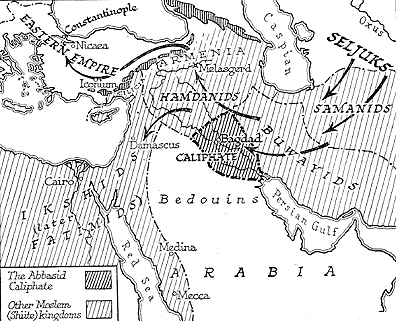|
The Turkish Dynasties |
||
|
While early on the Turks had an important role to play as soldiers conscripted to the personal guard of the Abbassid caliphs, soon they were no longer satisfied with this subordinate position. Often they took matters into their own hands and elevated themselves to positions of influence.
In 976, one of these military leaders founded the Ghaznavid dynasty (977 - 1186). But the Ghaznavids were unable to prevent the arrival of yet another powerful force, the Seljuks. They derived their name from an ancestor called Seljuk, whose nomadic tribe was converted to Islam, and were themselves originally central-Asian Turks. Toghrul Beg, sultan from 1038, first defeated the Ghaznavids, then sacked Isfahan in 1051 and went on to seize Baghdad from the Buwayids in 1055. Named protector of the caliph, Togrul Begh showed himself to be a vigorous defender of Sunni doctrine.
 |
The Advance of the Seljuks
In spite of the presence of the Turkish invaders, this era of Iranian revival, beginning with the publication of Ferdausi's Shah-namah, constitutes for Persia a period of intensely creative intellectual activity. Biruni, the most knowledgeable scientist of the Moslem middle ages, was interested in history, mathematics, astronomy and the physical and natural sciences. The poet, mathematician and astronomer Omar Khayyam, author of the famous Roubayyat, and the philosopher and theologian Ghazahli illustrate the wealth contributed by Persia to the sum of universal culture in the 11th and 12th Centuries.
By the second half of the 12th Century, the power of the Seljuks gave way to local dynasties set up by provincial governors. One of these provinces, Khorassan was governed by the princes of Khwarezm (1153), who set up a kingdom extending from the frontiers of China to those of Afghanistan. In 1217, the Khwarezmi armies reached as far as the Zagros Mountains but were never able to consolidate their conquests before the arrival of the Mongols.
| Persia or Iran | Top of page |
Persian Art Through the Centuries |
|
Copyright© 1998 K. Kianush, Art Arena